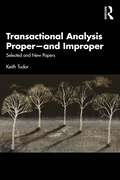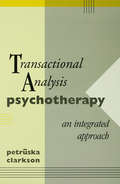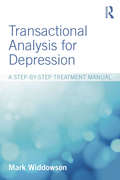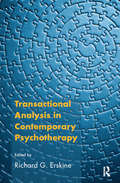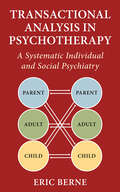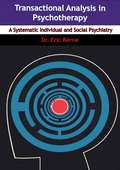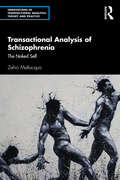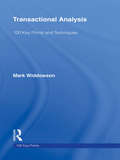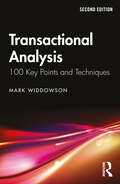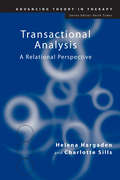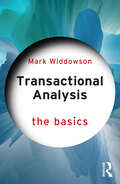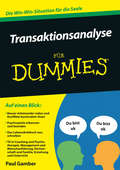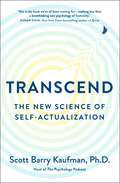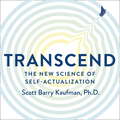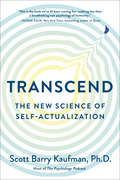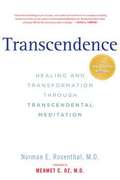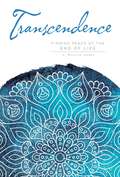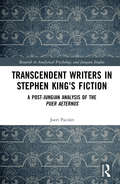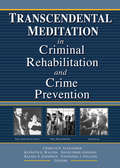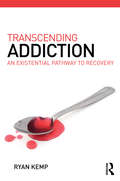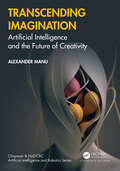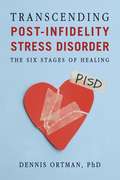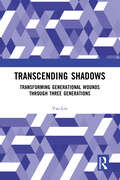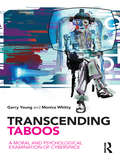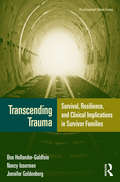- Table View
- List View
Transactional Analysis Proper—and Improper: Selected and New Papers
by Keith TudorTransactional Analysis Proper—and Improper: Selected and New Papers offers a critical reading of transactional analysis (TA), which analyses, deconstructs, and reconstructs its foundational theory.Keith Tudor’s work is detailed, informative, and critical, and written with deep affection for TA and its founder, Eric Berne. Beginning with its philosophical foundations, Tudor considers TA’s ontological assumptions about the essence of human beings, its method and methodology, and its treatment philosophy. A series of chapters then review and advance TA’s theory of transactions, ego states, life scripts, and psychological games, and the book concludes with two chapters which both honor TA’s traditions and look forward to what TA might do differently.This book offers a unique ‘insider but independent’ perspective on transactional analysis. It will be essential reading for students and practitioners of transactional analysis and encourages free, independent, and critical thinking about TA and its place in the world.
Transactional Analysis Psychotherapy: An Integrated Approach
by Petruska ClarksonTransactional Analysis Psychotherapy: An Integrated Approach is the first advanced clinical textbook for many years, written for psychotherapists and counsellors who use the theory and techniques of Transactional Analysis in their practice or who are interested in expanding their repertoire. Clarkson provides a comprehensive guide to goal-setting and clinical planning for every stage of treatment. Not only a practical textbook relevant to modern developments in supervision, but one which makes a new and original contribution to ways of thinking about transference and countertransference, the theory of self and the process of psychotherapeutic change.
Transactional Analysis for Depression: A step-by-step treatment manual
by Mark WiddowsonTransactional Analysis for Depression is the first research-based, transactional analysis psychotherapy manual. Developed from the author’s research into TA therapy for depression, the book also draws upon a wide range of contemporary research findings relating to depression and its treatment. Mark Widdowson provides the reader with a solid understanding about the nature of depression and clear guidance about how to provide effective psychotherapy for depressed clients. The book is a step-by-step guide to therapy, from the point of first contact through to ending, and covers: The theory and practice of TA therapy Understanding factors which maintain depression Conceptualising depression using Transactional Analysis Original material on the mechanisms of therapeutic change Optimising the psychotherapy process Key therapeutic processes in the therapy of depression Tailoring the therapy to client needs An introduction to neuroscience and the medical treatment of depression Complete with an additional resources section, including downloadable material designed to be given to clients to enhance the therapeutic process and strengthen the working alliance, Transactional Analysis for Depression provides structured, practical guidance to TA theory for therapists in practice and training.
Transactional Analysis in Contemporary Psychotherapy
by Richard G. ErskineAfter fifty years of development and refinement in Transactional Analysis (TA), the theory of methods and the actual methods have changed considerably from those originally published by Eric Berne. Many concepts and methods have emerged and been subject to clinical experimentation, some have been refined and expanded and some are no longer used. This book includes contributions from several authors, each of whom presents his or her unique focus on how TA is used in their psychotherapy practice. This book will address the therapeutic effectiveness of various methods in TA and will cover a variety of topics such as unconscious experience, transference-countertransference, the therapist's transparency, transgenerational scripts, trauma and regression, psychological games, the self-destructive client, an integrative approach to the psychotherapy of obsession, gender psychopolitics, and psychotherapy from a social-cognitive perspective. It is written for both psychotherapists and counsellors who want to learn and refine their knowledge of contemporary TA methods that are most effective with today's clients.
Transactional Analysis in Psychotherapy: A Systematic Individual and Social Psychiatry
by Eric BerneIn this groundbreaking work, psychiatrist Dr. Eric Berne introduces a new method for understanding and analyzing human behavior, known as transactional analysis or "TA", which examines the interactions, or "transactions," between individuals and the ways in which they change in response to each other. Core to TA is the thesis that humans, as social organisms, are capable of adapting and changing in response to others. Though developed more than a half century ago, TA continues to shape the field of psychiatry and remains required reading for anyone investing the subject.
Transactional Analysis in Psychotherapy: A Systematic Individual and Social Psychiatry (Condor Bks.)
by Dr Eric BerneOriginally published in 1961, this book outlines a new, unified system of individual and social psychiatry that were introduced in the United States around that time with remarkable success in various hospitals and other psychiatric establishments. Essentially designed for group therapy, this approach is now used by institutions, group workers, and in private practice with neurotics, psychotics, sexual psychopaths, psychosomatic cases, and adolescents.Transactional analysis begins its program by initiating the individual patients into the theory upon which the treatment is based. First attaining a measure of self-knowledge through private sessions with the analyst, the patient then meets with other patients in group therapy, participating in a series of personally meaningful relation-ships in which he becomes increasingly aware of the cause and nature of his illness, preparing at the same time to overcome it."A comprehensive method of treatment that has no precedent in its concreteness of structure without at the same time diminishing the dynamic quality of the treatment....No one to my knowledge has presented such a new approach."--Dr. Milton Schwebel, Professor of Education, New York University
Transactional Analysis of Schizophrenia: The Naked Self (Innovations in Transactional Analysis: Theory and Practice)
by Zefiro MellacquaIn Transactional Analysis of Schizophrenia: The Naked Self, Zefiro Mellacqua presents a full assessment of the relevance and value of transactional analysis in understanding, conceptualizing and treating schizophrenia in contemporary clinical settings. Opening with a review of Eric Berne’s ideas, Mellacqua applies theory to the understanding and psychotherapeutic treatment of people suffering from first-episode schizophrenia and to those already living with more long-lasting psychotic levels of self-disturbance. The chapters address a series of crucial methodological themes, including the need for both intensive and extensive analytic sessions; the therapist’s tolerance of uncertainty and not knowing; the informative quality of both therapist’s and patient’s embodiment(s); the emergence of the transference-countertransference relationship; the link between silent transactions and unconscious communication; dream analysis; and the value of regular supervisions. Mellacqua’s approach incorporates meetings with family and caregivers, as well as emphasising multidisciplinary work with patients in a variety of settings, such as in hospitals, outpatient clinics, and psychiatric home treatment. The book is illustrated with engaging clinical case studies throughout, which illuminate the schizophrenic experience and provide examples of how these tools can be used to help patients. Transactional Analysis of Schizophrenia demonstrates how those who suffer from acute schizophrenia, especially those at their very first episode of psychosis, can make an effective recovery and live a satisfying life through the therapeutic application of transactional analysis. It will be essential reading for transactional analysts, psychodynamically oriented psychotherapists, psychologists, psychiatrists, nurses, social workers, academics and all mental health professionals working with people suffering from schizophrenic psychoses.
Transactional Analysis: 100 Key Points and Techniques (100 Key Points)
by Mark WiddowsonTransactional Analysis (TA) is a versatile and comprehensive system of psychotherapy. Transactional Analysis: 100 Key Points and Techniques synthesises developments in the field, making complex material accessible and offering practical guidance on how to apply the theory and refine TA psychotherapy skills in practice. Divided into seven manageable sections, the 100 key points cover: the philosophy, theory, methods and critique of the main approaches to TA TA perspectives on the therapeutic relationship diagnosis, contracting and treatment planning using TA a trouble shooting guide to avoiding common pitfalls refining therapeutic skills As such this book is essential reading for trainee TA therapists, those preparing for examinations as well as experienced practitioners who will find much practical guidance on the skilful and mindful application of this cohesive system of psychotherapy.
Transactional Analysis: 100 Key Points and Techniques (100 Key Points)
by Mark WiddowsonThe second edition of Transactional Analysis: 100 Key Points and Techniques synthesizes developments in Transactional Analysis (TA) and psychotherapy research, making complex ideas accessible and offering therapists practical guidance on refining TA psychotherapy skills. Divided into seven parts, the 100 key points cover: • The philosophy, theory, methods and critique of the main approaches to TA • New developments and approaches in TA • TA perspectives on the therapeutic relationship • Client assessment, diagnosis and case formulation • Contracting and treatment planning using TA • A troubleshooting guide to avoiding common pitfalls • Refining therapeutic skills Specific updates incorporate emergent approaches in TA, recent developments in the understanding of neurodiversity and current best practice thinking. This book is essential reading for trainee and beginner TA therapists, as well as experienced practitioners looking to update their field knowledge for a skilful and mindful application of this cohesive system of psychotherapy.
Transactional Analysis: A Relational Perspective (Advancing Theory in Therapy)
by Charlotte Sills Helena HargadenTransactional analysis is growing in popularity as an approach to psychotherapy, and this book provides an in-depth, comprehensive model of theory and practice.Transactional Analysis: A Relational Perspective presents a relational model of psychotherapy which reflects the theoretical and methodological changes that have been evolving over recent years. In this book, Helena Hargaden and Charlotte Sills tell the story of their model through case history, theory and diagram illustrating how the unconscious process comes to life in the consulting room. Their relational theory and applied methodology of transactional analysis makes it possible to chart realms of uncertainty and the unknown, (deconfusion of the Child ego state), with theoretical assistance. Transactional Analysis: A Relational Perspective covers:* the approach* the dynamics of the relationship* therapeutic transactions* wider implications.It looks at the whole therapeutic relationship, from the establishment of the working alliance, to the terminating of therapy and beyond. It will be of great interest to postgraduates and professionals in the field of psychotherapy.
Transactional Analysis: The Basics (The Basics)
by Mark WiddowsonThis accessible textbook on transactional analysis (TA) provides a comprehensive overview of TA theory, with a strong emphasis throughout on practical application.The core theory of TA is explained, as well as how concepts have developed over time. Each theoretical concept is presented with brief examples or vignettes from different fields of application of TA (such as psychotherapy, counselling, education and organisational) and – crucially – how TA can be used in everyday life. To facilitate the learning of concepts, the book includes personal development activities at the end of chapters together with suggestions for further reading.This is an essential text for complete beginners and first year students on TA training courses as well as students on counselling and psychotherapy training, and those undertaking training in organisational development and coaching.
Transaktionsanalyse für Dummies (Für Dummies)
by Paul GamberHaben Sie auch schon einmal das Gefühl gehabt, an Ihrem Gesprächspartner vorbeizureden, ihn sozusagen auf dem falschen Fuß zu erwischen? Paul Gamber zeigt auf, wie mit den Werkzeugen der Transaktionsanalyse eine bessere Kommunikation möglich ist. Er erläutert, wie Sie positive Beziehungen aufbauen und pflegen, wie Sie destruktive Psychospiele durchschauen und vermeiden, wie Sie Glaubenssätze hinterfragen und verändern können. Sie erfahren, wie die Transaktionsanalyse in Erziehung und Unterricht, Coaching und Supervision, in der Psychotherapie und in Management und Menschführung eingesetzt wird, um sich selbst und andere besser zu verstehen.
Transcend: The New Science of Self-Actualization
by Scott Barry Kaufman'A MASTERPIECE' Susan CainHow to realise your full potential and live your most creative life. When psychologist Scott Barry Kaufman first discovered Maslow's unfinished theory of transcendence, sprinkled throughout a cache of unpublished journals, lectures, and essays, he felt a deep resonance with his own work and life. In this groundbreaking book, Kaufman picks up where Maslow left off, unraveling the mysteries of his unfinished theory, and integrating these ideas with the latest research on attachment, connection, creativity, love, purpose and other building blocks of a life well lived.Kaufman's new hierarchy of needs provides a roadmap for finding purpose and fulfillment - not by striving for money, success, or "happiness," but by becoming the best version of ourselves, or what Maslow called self-actualization. While self-actualization is often thought of as a purely individual pursuit, Maslow believed that the full realization of potential requires a merging between self and the world. We don't have to choose either self-development or self-sacrifice, but at the highest level of human potential we show a deep integration of both. Transcend reveals this level of human potential that connects us not only to our highest creative potential, but also to one another.With never-before-published insights and new research findings, along with exercises and opportunities to gain insight into your own unique personality, this empowering book is a manual for self-analysis and nurturing a deeper connection not only with our highest potential but also with the rest of humanity.
Transcend: The New Science of Self-Actualization
by Scott Barry Kaufman'A MASTERPIECE' Susan CainHow to realise your full potential and live your most creative life.When psychologist Scott Barry Kaufman first discovered Maslow's unfinished theory of transcendence, sprinkled throughout a cache of unpublished journals, lectures, and essays, he felt a deep resonance with his own work and life. In this groundbreaking audiobook, Kaufman picks up where Maslow left off, unraveling the mysteries of his unfinished theory, and integrating these ideas with the latest research on attachment, connection, creativity, love, purpose and other building blocks of a life well lived.Kaufman's new hierarchy of needs provides a roadmap for finding purpose and fulfillment - not by striving for money, success, or "happiness," but by becoming the best version of ourselves, or what Maslow called self-actualization. While self-actualization is often thought of as a purely individual pursuit, Maslow believed that the full realization of potential requires a merging between self and the world. We don't have to choose either self-development or self-sacrifice, but at the highest level of human potential we show a deep integration of both. Transcend reveals this level of human potential that connects us not only to our highest creative potential, but also to one another.With never-before-published insights and new research findings, this empowering audiobook is a manual for self-analysis and nurturing a deeper connection not only with our highest potential but also with the rest of humanity.(P) 2020 Penguin Audio
Transcend: The New Science of Self-Actualization
by Scott Barry KaufmanA bold reimagining of Maslow's famous hierarchy of needs--and new insights for realizing your full potential and living your most creative, fulfilled, and connected life.When psychologist Scott Barry Kaufman first discovered Maslow's unfinished theory of transcendence, sprinkled throughout a cache of unpublished journals, lectures, and essays, he felt a deep resonance with his own work and life. In this groundbreaking book, Kaufman picks up where Maslow left off, unraveling the mysteries of his unfinished theory, and integrating these ideas with the latest research on attachment, connection, creativity, love, purpose and other building blocks of a life well lived. Kaufman's new hierarchy of needs provides a roadmap for finding purpose and fulfillment--not by striving for money, success, or "happiness," but by becoming the best version of ourselves, or what Maslow called self-actualization. While self-actualization is often thought of as a purely individual pursuit, Maslow believed that the full realization of potential requires a merging between self and the world. We don't have to choose either self-development or self-sacrifice, but at the highest level of human potential we show a deep integration of both. Transcend reveals this level of human potential that connects us not only to our highest creative potential, but also to one another.With never-before-published insights and new research findings, along with exercises and opportunities to gain insight into your own unique personality, this empowering book is a manual for self-analysis and nurturing a deeper connection not only with our highest potential but also with the rest of humanity.
Transcendence
by Rosenthal Norman E."Dr. Norman Rosenthal's Transcendence is the best-ever book on Transcendental Meditation: accessible and substantive, engaging and scientific, practical and profound. A very enjoyable read that can change your life, for good. " - David Lynch "I have been meditating for over 10 years, and I found Transcendence to be a uniquely compelling introduction to the art and science of Transcendental Meditation. Dr. Norman Rosenthal's book will propel TM into the mainstream where it belongs. " - Russell Simmons In this definitive book on the scientifically proven health and stress-relieving benefits of Transcendental Meditation, a renowned psychiatrist and researcher explores why TM works, what it can do for you, and how to use it for maximum effect. Norman E. Rosenthal, M. D. , a twenty-year researcher at the National Institute of Mental Health and the celebrated psychiatrist who pioneered the study and treatment of Season Affective Disorder (SAD), brings us the most important work on Transcendental Meditation since the Maharishi Mahesh Yogi's Science of Being and Art of Living-- and one of our generation's most significant books on achieving greater physical and mental health and wellness. Transcendence demystifies the practice and benefits of Transcendental Meditation for a general audience who may have heard about the method but do not necessarily know what it is, how it is learned, or what they stand to gain, physically and emotionally, from achieving transcendence. Dr. Rosenthal clearly and practically explains the basic ideas behind Transcendental Meditation: It is a nonreligious practice that involves sitting comfortably for twenty minutes twice a day while using a silent mantra, or nonverbal sound, to attain a profound state of aware relaxation. Alongside exclusive celebrity interviews-where figures like Paul McCartney, Ringo Starr, Martin Scorsese, Russell Brand, Laura Dern, Moby, and David Lynch openly discuss their meditation-Dr. Rosenthal draws upon experience from the lives of his patients and a wealth of clinical research amassed on TM over the past generation (340 peer-reviewed published articles). He provides the fullest and most accessible book ever on the broad range of benefits of this remarkably simple practice, from relief of anxiety, stress and depression to new hope for those experiencing addiction, attention-deficit disorder, or post-traumatic stress disorder. .
Transcendence: Finding Peace at the End of Life
by J. Phillip JonesTranscendence gently guides readers through the experiences that surround death through the lens of Eastern philosophy and the author&’s own experience as a hospice counselor.All of us die, and most of us are called upon to support loved ones or friends in dying or in grieving a death. We wonder about the nature of this universal phenomenon: Is dying only an uninvited tragedy or can it also be seen as a rite of passage? Can one's end of life journey be a time of finding inner peace, completion, and even growth? Transcendence views life as a pilgrimage culminating in the Great Transition at death. Rather than fearing our end, it invites us to reach once more for personal and spiritual growth in our sacred journey. Drawing on insights from the ancient sages of India as well as modern hospice experiences, the author explores a spiritual art of dying as the last and most powerful rite of passage. The Mandala Wisdom Series is an introductory collection on Eastern wisdom and spirituality, providing readers with the tools to enhance their health and well-being.
Transcendent Writers in Stephen King's Fiction: A Post-Jungian Analysis of the Puer Aeternus (Research in Analytical Psychology and Jungian Studies)
by Joeri PacoletTranscendent Writers in Stephen King’s Fiction combines a post-Jungian critical perspective of the puer aeternus. Offering new insight into King’s work, it provides reconceptualisation of the eternal youth to develop a new theory: the concept of the transcendent writer. Combining recent Jungian and Post-Jungian developmental theories, this analysis of a selection of classic King novels addresses the importance of the stories within King’s main narrative, those of King‘s writer-protagonists; an aspect often overlooked. Using these stories-within-stories, it demonstrates the way in which King’s novels illustrate their young protagonist’s trajectories into adulthood and delineates King’s portrayal of the psychological development of adolescence and their ambivalent experience of the world. This book demonstrates how the act of writing plays a crucial role for King’s writer-protagonists in their search for a stable identify, guiding us through their journey from disaffected youths to well-rounded adults. Transcendent Writers in Stephen King's Fiction will be of interest to Jungian and post-Jungian scholars, philosophers and teachers focusing on the theme of psychological development and identity, and to those studying literature with a particular interest in horror.
Transcendental Meditation® in Criminal Rehabilitation and Crime Prevention
by Kenneth G Walton David Orme-Johnson Rachel S GoodmanIn contrast to the generally dismal results of various approaches to rehabilitation, these consciousness-based strategies have proven effective in preventing crime and rehabilitating offenders! This book will introduce you to a powerful, unique approach to offender rehabilitation and crime prevention. In contrast to the generally dismal results of most rehabilitation approaches, studies covering periods of 1-15 years indicate that this new approach-employing the Maharishi Transcendental Meditation® and TM-Sidhi programs-reduces recidivism from 35-50%. Transcendental Meditation® in Criminal Rehabilitation and Crime Prevention provides the reader with a theoretical overview, new original research findings, and examples of practical implementation. With this book, you will explore what motivates people to commit crimes, with emphasis on stress and restricted self-development. Then you'll examine the results and policy implications of applying these consciousness-based techniques to offender rehabilitation and crime reduction. Most chapters include tables or figures that make the information easy to understand. Transcendental Meditation® in Criminal Rehabilitation and Crime Prevention does not merely review the theory behind this innovative approach to rehabilitation and prevention but also emphasizes the practical value of the programs it describes and reports how techniques and strategies based on Transcendental Meditation® have been put to use in a variety of settings. This book will familiarize the reader with: a rehabilitation approach so universal in its applicability that any adult or juvenile offender can begin it at the point of sentencing, during incarceration, or at the point of parole the in-depth background on adult growth and higher states of consciousness necessary to understand this consciousness-based, developmental approach the results of empirical studies conducted in prisons around the country, with up to 15 years of follow-up a preview of how cost-effective the rehabilitation program might be implications for public policy and the judicial system-including an innovative alternative sentencing program how this approach deals not only with individuals but also with the community as a whole-when practiced by a small percentage of the population, the TM and TM-Sidhi programs may reduce crime in the larger community how these society-level prevention programs may prove to be effecitive in reducing not only school violence in the community but, if applied on sufficient scale, war deaths and terrorism in the greater society
Transcending Addiction: An Existential Pathway to Recovery
by Ryan KempAddiction is often thought about in terms of cause, be that brain chemistry, attachment patterns or cognitive schemas. But this does not allow an understanding of what addiction "is". It does not illuminate how addiction is lived. A phenomenology of addiction reveals that addiction is characterised by an intolerance of pain, a pursuit of pleasure, immediacy, technocratic solutions, alienation, ambiguity and is drenched in deception. These are its individual clinical manifestations, but this is also the way life, in this century, is lived. The addict is thus the ultimate 21st century subject, consuming without end, intolerant of emotion and unable to grasp their own limitations. Rather than embraced, these subjects act as a denied symptom, haunting late capitalism and exposing the vampire-like nature of our culture. As such, these subjects need to be treated not just as individuals who have "gone too far", but as victims of the political agenda shaping our lives. Thus the heart of the book is a description of addiction deepened by existential-phenomenological theory. This description is then used to understand the historical emergence of addiction, its socio-political manifestation and also the crucial issue of how to clinically treat the addict-subject.
Transcending Imagination: Artificial Intelligence and the Future of Creativity (Chapman & Hall/CRC Artificial Intelligence and Robotics Series)
by Alexander ManuImagine a world where the boundaries of creativity are not only stretched but redefined. This book serves as your guide to this new frontier, engaging general readers, tech enthusiasts, and creatives alike in the captivating interplay between human ingenuity and artificial intelligence (AI).Journey through the ground-breaking advancements in AI as they intersect with art, design, entertainment, and education. Discover how AI’s power to analyze and understand language can be harnessed to generate breathtaking visuals from mere text descriptions—a process known as text-conditional image generation. But this book goes beyond just showcasing AI’s capabilities: it delves into its transformative effects on the creative process itself. How will artists and designers adapt to a world where they co-create with machines? What are the implications of AI-generated art in educational settings? This book tackles these questions head on, offering a comprehensive view of the changing landscape of creativity.At its core, this book challenges you to rethink what’s possible in the realm of artistic expression. Manu contends that as AI evolves, mastering the art of collaboration between human and machine will become essential. More than just a look into the future, Transcending Imagination: Artificial Intelligence and the Future of Creativity is a roadmap for artists, designers, and educators eager to navigate the uncharted territory of AI-augmented creativity. It is a must-read for anyone interested in how AI might redefine the realms of art, design, and education.
Transcending Post-Infidelity Stress Disorder: The Six Stages of Healing
by Dennis C. OrtmanHave you been traumatized by infidelity? The phrase "broken heart" belies the real trauma behind the all-too-common occurrence of infidelity. Psychologist Dennis Ortman likens the psychological aftermath of sexual betrayal to post-traumatic stress disorder (PTSD) in its origin and symptoms, including anxiety, irritability, rage, emotional numbing, and flashbacks. Using PTSD treatment as a model, Dr. Ortman will show you, step by step, how to: * work through conflicting emotions* Understand yourself and your partner* Make important life decisions Dr. Ortman sees recovery as a spiritual journey and draws on the wisdom of diverse faiths, from Christianity to Buddhism. He also offers exercises to deepen recovery, such as guided meditations and journaling, and explores heart-wrenchingly familiar case studies of couples struggling with monogamy. By the end of this book, you will have completed the six stages of healing and emerged with a whole heart, a full spirit, and the freedom to love again.From the Trade Paperback edition.
Transcending Shadows: Transforming Generational Wounds Through Three Generations
by Yao LinBased on interviews with three generations of three families, this book clarifies why the Cultural Revolution in China (1966–1976) had a uniquely traumatic impact on those affected, and shows the forms this trauma has taken in the lives of their second and third generations at both inter-subjective and intra-psychic levels.As a psychoanalytically oriented, qualitative study of the aftermath of the Cultural Revolution, this book investigates the role played by the beliefs, practices, and narratives which were ideologically formative during the Cultural Revolution, showing their role in the trans-generational transmission of trauma and how they still prevent a collective means of dealing with this trauma today. Instead of a collective remembering, a collective repression prevents the symbolization of memory on a societal level, and families serve as a space for this unresolved trauma. In this context, psychoanalysis is shown to be an effective way of interrupting and healing the transmission of trauma across the generations. Within a longer historical framework, this book also explores the Cultural Revolution as a defensive compulsory repetition of the traumas that China had previously experienced on a political and cultural level.Bearing witness to a personal process of transforming a wound into work, this first-person account offers in-depth understanding and guidance for psychotherapists and psychoanalysts engaged in interrupting and healing the trans-generational transmission of trauma.
Transcending Taboos: A Moral and Psychological Examination of Cyberspace
by Garry Young Monica WhittyCyberspace is composed of a multitude of different spaces where users can represent themselves in many divergent ways. Why in a video game, is it more acceptable to murder or maim than rape? After all, in each case, it is only pixels that are being assaulted. This book avoids wrestling with the common question of whether the virtual violation of real-world taboos is right or wrong, and instead provides a theoretical framework that helps us understand why such distinctions are typically made, and explores the psychological impact of violating offline taboos within cyberspace. The authors discuss such online areas as: ‘Reality’ sites depicting taboo images Social networking websites and online chatrooms Online dating websites Video game content. This book considers whether there are some interactions that should not be permissible even virtually. It also examines how we might be able to cope with the potential moral freedoms afforded by cyberspace, and who might be vulnerable to such freedoms of action and representation within this virtual space. This book is ideal for researchers and students of internet psychology, philosophy and social policy, as well as therapists, those interested in computer science, law, media and communication studies
Transcending Trauma: Survival, Resilience, and Clinical Implications in Survivor Families (Psychosocial Stress Series)
by Bea Hollander-Goldfein Nancy Isserman Jennifer GoldenbergBased on twenty years of intense qualitative research, Transcending Trauma presents an integrated model of coping and adaptation after trauma that incorporates the best of recent work in the field with the expanded insights offered by Holocaust survivors. In the book’s vignettes and interview transcripts, survivors of a broad range of traumas will recognize their own challenges, and mental-health professionals will gain invaluable insight into the dominant themes both of Holocaust survivors and of trauma survivors more generally. Together, the authors and contributors Sheryl Perlmutter Bowen, Hannah Kliger, Lucy Raizman, Juliet Spitzer and Emilie Scherz Passow have transformed qualitative narrative analysis and framed for us a new and profound understanding of survivorship. Their study has illuminated universal aspects of the recovery from trauma, and Transcending Trauma makes a vital contribution to our understanding of how survivors find meaning after traumatic events.Accompanying Transcending Trauma are downloadable resources of full-text life histories that documents the survivor experience. In seven comprehensive interviews, survivors paint a picture of life before and after war and trauma: their own feelings, beliefs, and personalities as well as those of their family; their struggles to deal with loss and suffering; and the ways in which their family relationships were able, in some cases, to mediate the transmission of trauma across generations and help the survivors transcend the trauma of their experiences.
